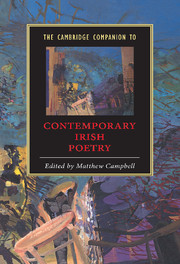Book contents
- Frontmatter
- 1 Ireland in poetry
- 2 From Irish mode to modernisation
- 3 Patrick Kavanagh and antipastoral
- 4 Louis MacNeice
- 5 The Irish modernists and their legacy
- 6 Poetry of the 1960s
- 7 Violence in Seamus Heaney's poetry
- 8 Mahon and Longley
- 9 Between two languages
- 10 Boland, McGuckian, Ni Chuilleanain and the body of the nation
- 11 Sonnets, centos and long lines
- 12 Performance and dissent
- 13 Irish poets and the world
- 14 Irish poetry into the twenty-first century
- Further reading
- Index
- Series List
4 - Louis MacNeice
irony and responsibility
Published online by Cambridge University Press: 28 May 2006
- Frontmatter
- 1 Ireland in poetry
- 2 From Irish mode to modernisation
- 3 Patrick Kavanagh and antipastoral
- 4 Louis MacNeice
- 5 The Irish modernists and their legacy
- 6 Poetry of the 1960s
- 7 Violence in Seamus Heaney's poetry
- 8 Mahon and Longley
- 9 Between two languages
- 10 Boland, McGuckian, Ni Chuilleanain and the body of the nation
- 11 Sonnets, centos and long lines
- 12 Performance and dissent
- 13 Irish poets and the world
- 14 Irish poetry into the twenty-first century
- Further reading
- Index
- Series List
Summary
In an uncollected poem of 1995, ʿMacNeiceʾs Londonʾ, Derek Mahon imagines Louis MacNeice in wartime, in ʿA bunker of civilised sound, / A BBC studioʾ:
Thirty years dead
I see your ghost, as the Blitz carooms overhead,
Dissolve into a smoke-ring, meditative,
Classic, outside time and space,
Alone with itself, in the presence of the nations,
Well-bred, dry, the voice
Of London, speaking of lost illusions.
These lines capture, in a brilliant miniature, much of the complexity of Louis MacNeiceʾs cultural and historical situations. While the adjectives here - ʿmeditativeʾ, ʿclassicʾ, ʿaloneʾ, ʿwell-bredʾ, ʿdryʾ - seem to map out the distinctive qualities of the poetʾs voice, that voice is also working as ʿthe voice/ Of Londonʾ while it speaks from the wartime BBC to the world. Mahonʾs final line-break allows the reader to sense the distance between the intimacy and solitude of the poet and the prepared voice of the public writer: as ʿthe voiceʾ turns into ʿthe voice/ Of Londonʾ, we feel a mild and complicating shock of something ʿoutside time and spaceʾ that suddenly locates itself in a specific moment and situation.
- Type
- Chapter
- Information
- The Cambridge Companion to Contemporary Irish Poetry , pp. 59 - 75Publisher: Cambridge University PressPrint publication year: 2003

